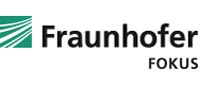

Berlin-Charlottenburg, a van parks at the roadside. It is equipped with diverse modems and antennas. The vehicle is a temporary node in the 5G mobile network at the Fraunhofer Institute FOKUS and is an example of future private networks.
On construction sites, for example, the vehicle can become a component of the construction company's special mobile network. As a temporary 5G connectivity island, the vehicle can transmit the video data of the surveillance camera in near real time and thus help to detect thefts quicker.
The first 5G standards are in place, device manufacturers are in the process of bringing 5G-enabled base stations and terminals to market, and network operators are preparing the commercial roll-out for 2020. Prof. Dr. Thomas Magedanz, director of the Software-based Networks business unit, recommends:
“While China, South Korea and Japan have a head start in providing commercial 5G multimedia services from 2019, Germany has outstanding industry 4.0 expertise and should leverage 5G's innovation potential for industrial applications.”
In order to test new applications, Fraunhofer FOKUS offers the “Berlin 5G Playground”, an end-to-end test environment consisting of the following elements:
• a comprehensive test infrastructure for indoor and outdoor. Using a 100 Gbit broadband backhaul connection, partners in Berlin and throughout Germany can also be connected to the fast 5G test network.
• a wide range of network infrastructure hardware: For this purpose, the researchers installed devices such as antennas, sensors, switches and end systems in the building and around the institute.
• software modules developed by FOKUS for the management of infrastructure and network functions (Open Baton).
• the first 3GPP compliant software-based 5G core network (Open5GCore) developed by FOKUS.
• Edge computing technologies developed by FOKUS that enable decentralized data processing and thus ensure increased speed and security in industrial applications.
• first demonstration and application scenarios as a basis for customer-specific applications.
5G offers high data rates with very low latency times, made possible by major advances in the radio sector. No less important are the changes in the core network area, which enable the creation of demand-specific complex network structures. In the software-based implementation, network functions are dynamically combined into an individual, virtual special network – depending on the required latency time, security level and the number of devices to be connected. Edge computing, i.e. the use of decentralized computing resources close to the point of use, and network slicing, through which virtual, demand-oriented networks are available in the network, are the central technologies here.
5G enables the integration of existing wireless technologies in a core network. In the “Berlin 5G Playground” 4G, 5G, WiFi, and satellite communication are currently available. The test network has “small cells” and a “macro-cell“, i.e. radio cells of different sizes, which consist of base stations with mobile radio antennas in which mainly frequencies of 3.7 GHz-3.8 GHz are used. In addition, a spectrum in the 700 MHz frequency range can also be used, so that the Brandenburg Gate can still be reached from the roof of the institute. The Fraunhofer FOKUS software used in the “Berlin 5G Playground“ is not tied to the location Berlin. Fraunhofer FOKUS offers the software packages “5G Cube” and “5G Ready Trial Platform”, with which 5G test networks are already being set up worldwide and innovative 5G applications are being tested.
Further information:
Berlin5GWeek:
http://www.berlin5gweek.org/
Berlin 5G Playground:
https://www.fokus.fraunhofer.de/go/en/fokus_testbeds/5g_playground
Open5GCore:
https://www.open5gcore.org/
5G Ready Trial Platform:
https://www.fokus.fraunhofer.de/go/en/5GRTP
Journalists are welcome to register for the Berlin5GWeek at presse@fokus.fraunhofer.de.
Press contact:
Fraunhofer Institute for Open Communication Systems FOKUS
Mitra Motakef-Tratar
Corporate Communications
Telephone: +49 30 3463-7517
mitra.motakef-tratar@fokus.fraunhofer.de
Fraunhofer FOKUS
Fraunhofer FOKUS researches digital transformation and its impact on society, economics and technology. Since 1988 it supports commercial enterprises and public administration in the shaping and implementation of the digital transformation. For this purpose, Fraunhofer FOKUS offers research services ranging from requirements analysis to consulting, feasibility studies, technology development right up to prototypes and pilots in the business segments Digital Public Services, Future Applications and Media, Quality Engineering, Smart Mobility, Software-based Networks, Networked Security, Visual Computing und Analytics. With about 430 employees in Berlin and an annual budget of 30 million euros, Fraunhofer FOKUS is the largest ICT institute of the Fraunhofer Society. Around 70% of its budget is generated through projects from industry and the public domain.















